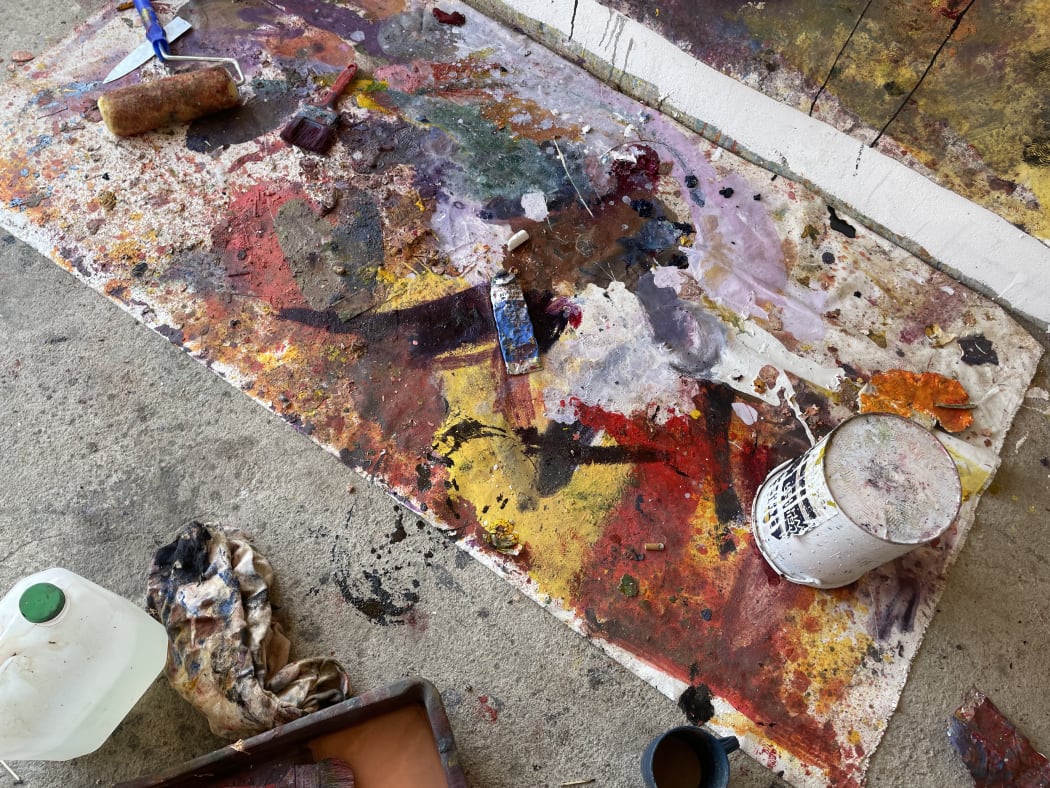
© Mostaff Muchawaya's Studio. Image: Mostaff Muchawaya
Let's get back to the roots: Your interest in art began at a young age, when you were making clay toys and developing sketches of the farmers’ dogs. Do you remember the very first moment when you decided to become an artist? What was the reaction of your family and friends?
I started to get interested in art when I was twelve years old. I grew up in the province of Manicaland located in the mountainous East area of Zimbabwe. My parents resided on a white-owned tobacco farm. The daughter of the farmer, Nicole, always painted in the house. I used to observe her painting and this experience inspired me for becoming an artist. At first, I began to make toys, like tractors, or cars. Unlike my parents who did not really recognize my talent, the owners of the farm did. They recognized my skills at a very young age and persuaded me to go to school. They even provided me with a scholarship, so I got an opportunity to study art. I moved to Harare in 2003, where I attended the National Gallery of Zimbabwe School of Visual Arts and Design.
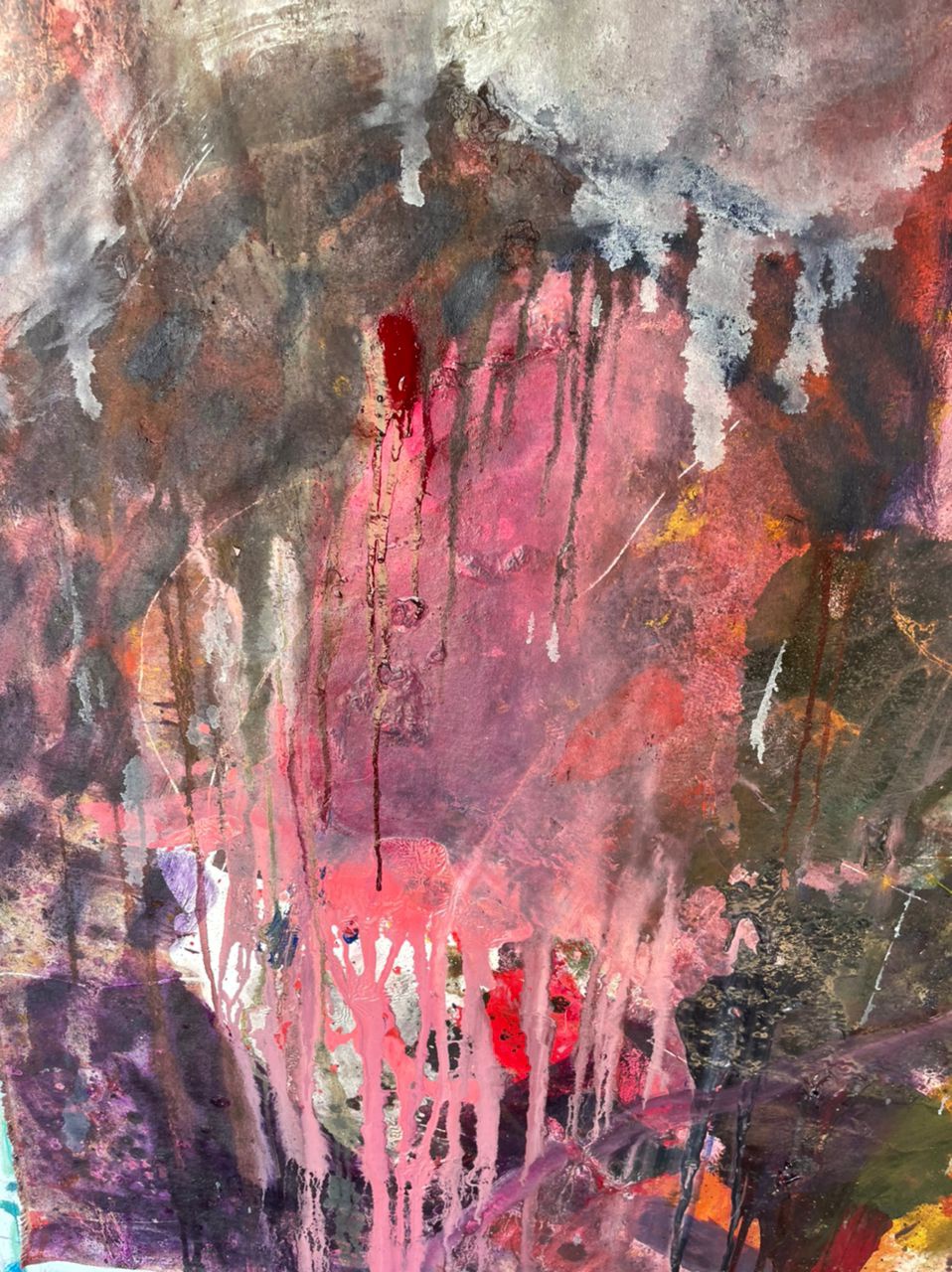
© Mostaff Muchawaya' studio. Image: Mostaff Muchawaya
Could you tell us about your approach to the creation process? Is it a completely spontaneous one, based on improvisation and intuition, or is it rather a strategic planning, meaning working with sketches and elaborating the concept of the artwork in your mind?
I often do some sketches before creating an artwork. But I also enjoy going to nature and trying to portray it, trying to depict the very moment. Sometimes I also find subjects for my paintings, when I address to my memory, when I go back to my past and recall my memories and my upbringing.
Quite often you depict a faceless woman – who is she and what does she symbolize? Could you probably tell us about the protagonists of your art? Who are the figures that you incorporate into your works?
I am very emotional and very passionate at the same time. My mother gave me birth, she was the first woman, who I met, and I trusted her completely. My mother is my identity. So, the woman, that you see in my works, to some extent symbolizes myself, that is my self-portrait. Besides, I really love women. Therefore, I often dedicate my artworks to the women who surround me. Summing up I can say that a faceless woman is a kind of a composite image of all the women I have met in my life, including my mother.
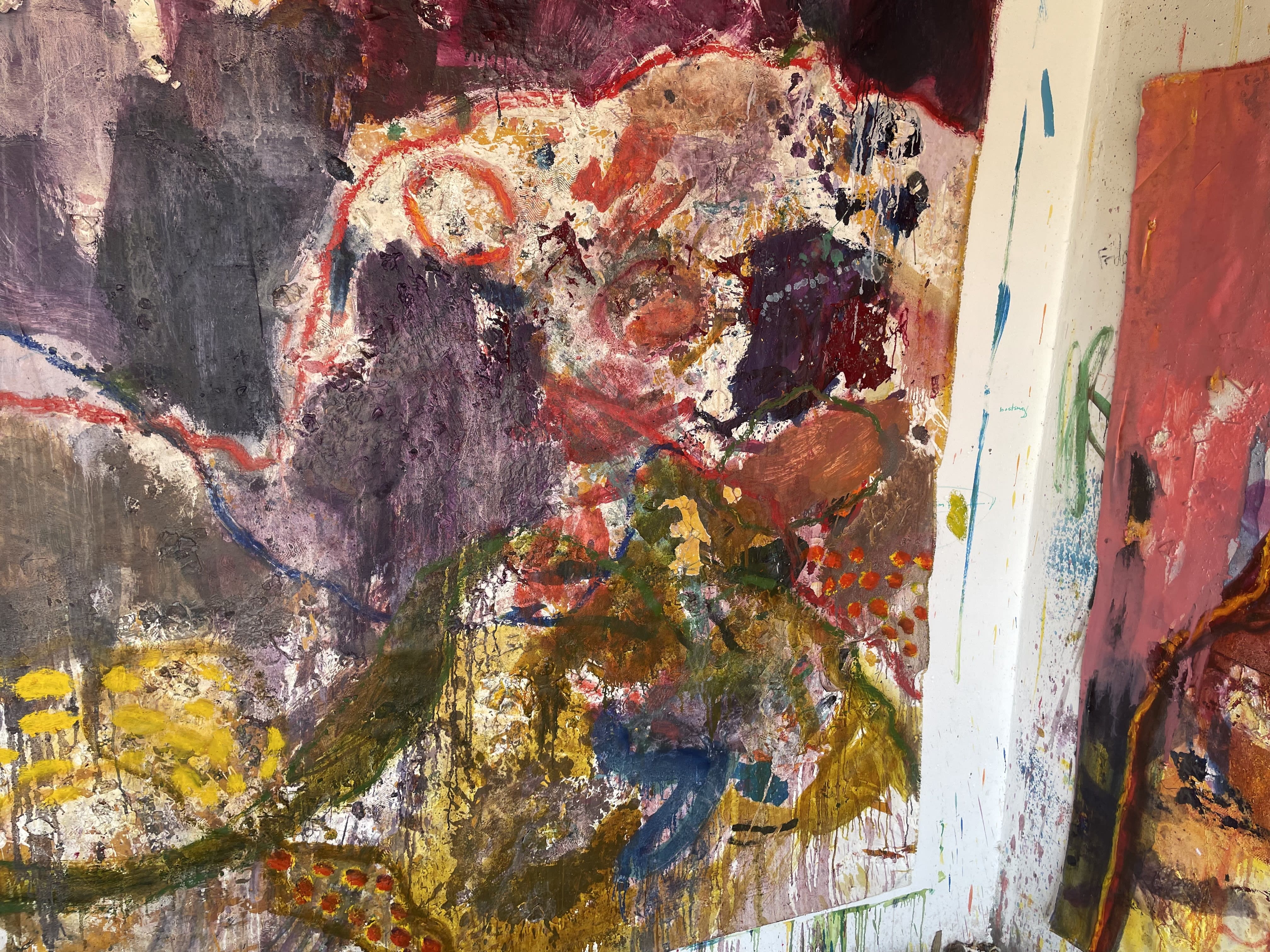
© Mostaff Muchawaya' studio. Image: Mostaff Muchawaya
You have once said about your portraits that you “don’t put faces but leave room for the viewer to find their face.” Could you probably give us a short comment on this?
All my works deal with memory. In my paintings I always try to say, where I come from and who I am, I show the land where I grew up as well as people who were around me. We had a very strong emotional connection with my parents, that I feel even today. So, my inspiration comes from the people, I grew with, as well as from the landscape that surrounded me. That is why the portraits that I create often bring together many different people and types, so each viewer “can find their face” in the end.
Your paintings often address your personal experience and your family’s past. And to what extent do the current political and social African narratives influence your work? Do you question issues surrounding the continent in your art?
To tell you the truth, I am not really interested in making art addressing social or political issues. Maybe in 20 percent of my work or even less I reflect on political questions and the rest are about my way, my life path, about how I got to the point, where I am now. I prefer to depict my beloved ones, people who are close to me, as well as investigate my personal feelings and emotions. I am not politically active, and my art rarely explores social or political challenges, our society deals with.
Your technique is truly unique. You start off each painting with a generous layering of paint, shave and scrape off some of the dried paint, and then paint again. How did you come up with this idea and what message does this process of applying paint and then abrading it shall transmit?
In my artworks I always try to portray memory. And these layers of paint symbolize memory for me – they carry information, just like our memories, saved in our head. Basically, each layer symbolizes a year that I went through, All these layers that we have in the painting mean the passage of time.
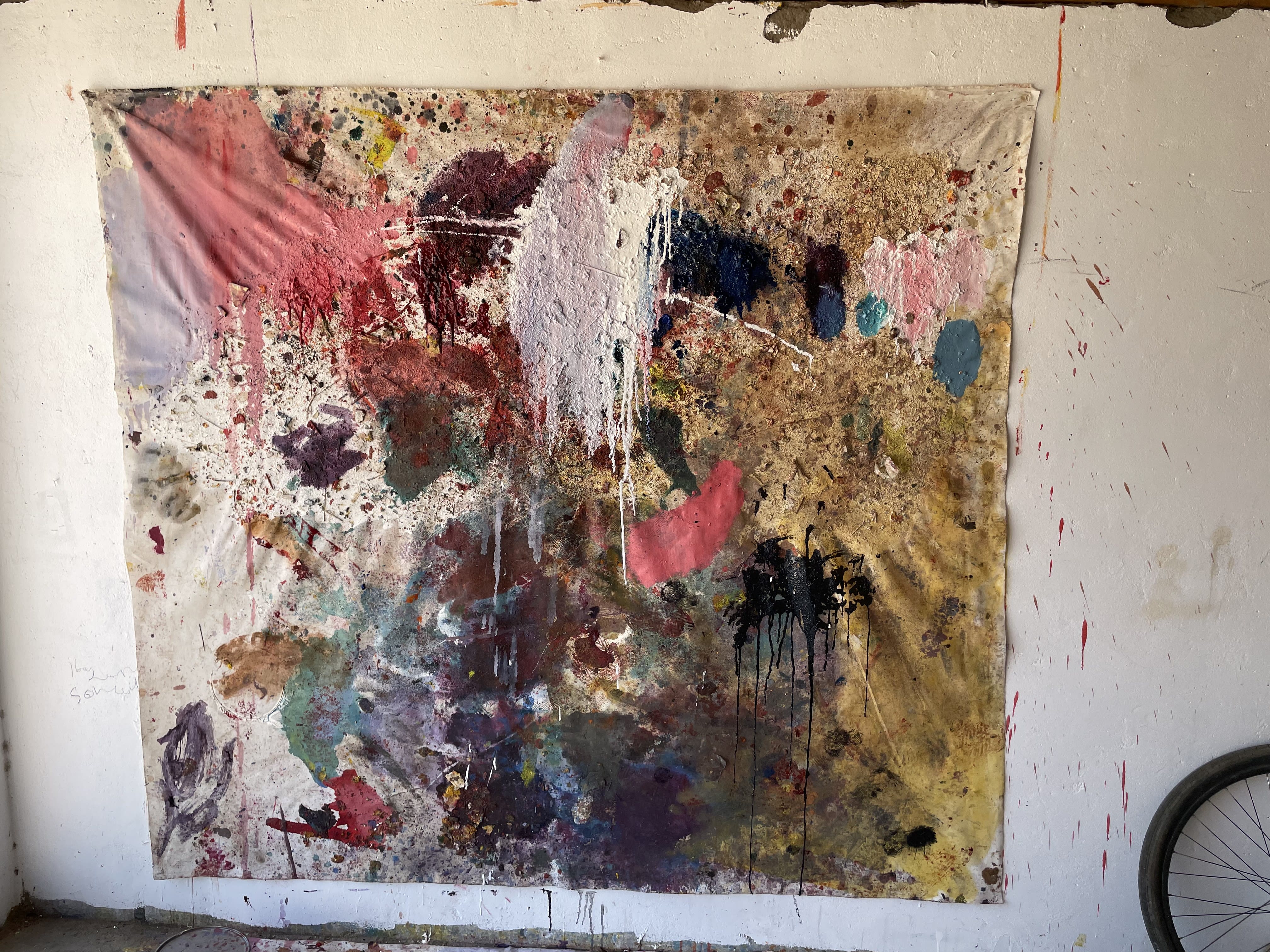
© Mostaff Muchawaya' studio. Image: Mostaff Muchawaya
I have read that you incorporate South African Ubuntu ideology into your art. Could you please tell us more about Ubuntu and what does it mean for you personally as well as for the society?
Ubuntu is all about our cultural existence. Ubuntu is actually a traditional, indigenous philosophy of Southern Africa, which emphasizes the importance of a community. However, it is a very personal thing, and everybody describes it in its own way. According to my feelings and thoughts, ubuntu is where I came from. It is part of my identity, part of my culture.
Are there artists that you admire or that have influenced your practice?
After leaving the farm I met Misheck Masamvu, who is a famous artist from Zimbabwe. Also, at school in Harare there were plenty of contemporary Zimbabwe artists that inspired me. We studied together, we experienced a lot of things together, we learned how to make art together. Our studios were close to each other, so we used to visit each other, exchanging our thoughts and ideas.
And last but not least. How has your artistic practice developed through the years? And how do you see your practice developing in the future?
My art has been transforming quite a lot. Finding your technique, is a very long process. When you are at school, you just make first acquaintance with the art. You learn, how to draw, you learn the proportions. After that I decided to go on my own, to discover myself. And my starting point was where I came from – the landscapes, nature, all these magnificent views of the mountains. I really love nature, I have always loved it, since my very young age.
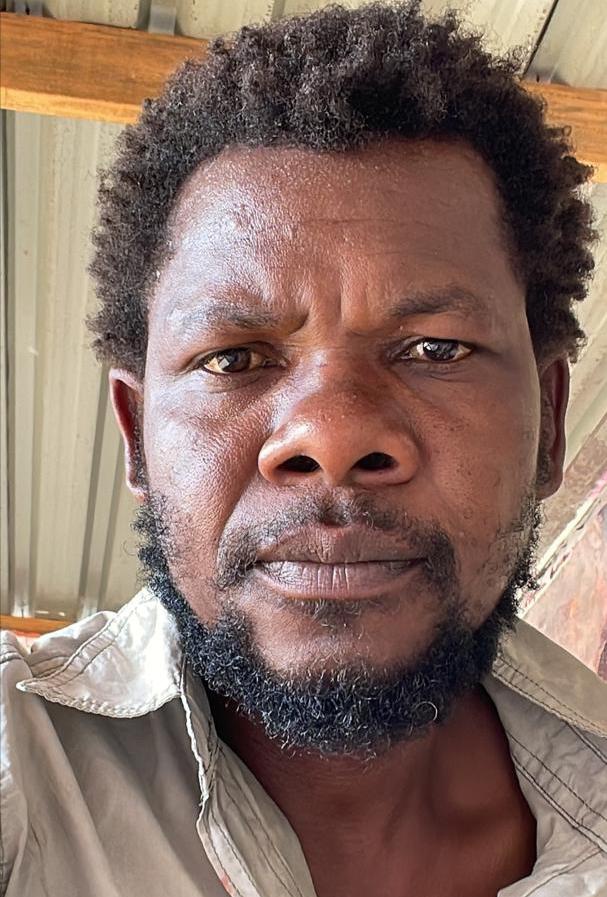
© Mostaff Muchawaya. Image: Mostaff Muchawaya